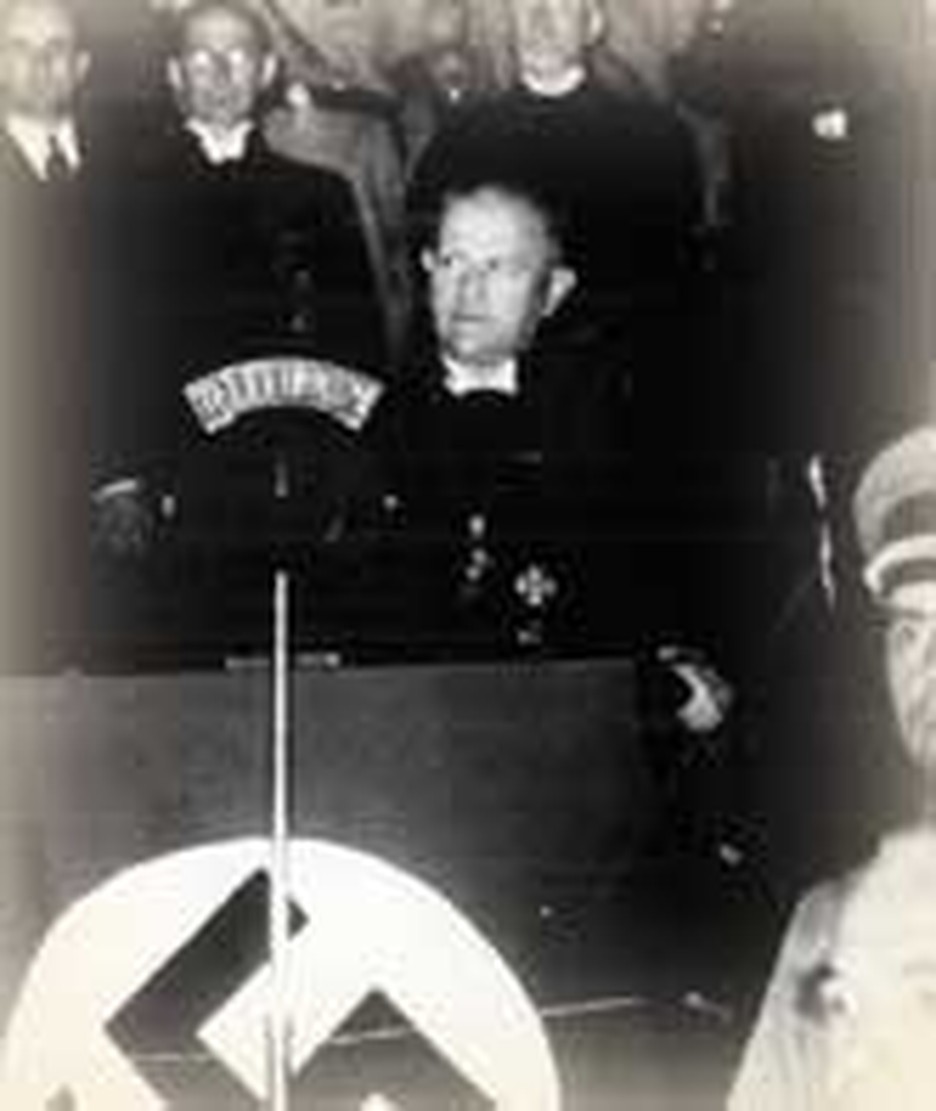
Hitler's Nazi regime in Germany was one of the most heinous in all history. However, when it first came to power, it was welcomed by many German church members. One church leader even said that Hitler's rise was a gift of mercy from God's hand. We can understand his thinking only if we remember that it was still early in Hitler's rule and that many Germans were afraid the Communists would take over their country if not opposed by the Nazis. Furthermore, Hitler replaced the decadent Weimar Republic that had produced a literature and art of despair. Large numbers of Germans hoped that Hitler would bring spiritual renewal because he talked about their history and traditions.
Most of the churches in Germany were Lutheran, organized into provinces. A movement took fire to nationalize the church under a single Reichs-bishop. This was actually a trick to bring the church under Nazi control. In May, 1933, the unified national church produced its constitution. The so-called "German Christians" elected Ludwig Müller, a fervent Nazi, to head it. In July, he placed two restrictions on the clergy. A clergyman (1) must be politically reliable and (2) must accept the superiority of the Aryan race. Hundreds of clergy accepted these demands.
A small group of church leaders did not. They openly opposed those German Christians who did accept the government's terms. The dissidents insisted that the church must obey Christ apart from political influence. In September, 1933, Martin Niemoeller sent a letter to all German pastors, inviting them to join a Pastor's Emergency League to oppose the unified church. Karl Barth and Dietrich Bonhoeffer were among those who joined him. In October, Niemoeller asked pastors to bind themselves by the scripture and the old confessions of faith. They pledged themselves to protest certain violations of the faith, to stand with the persecuted, and to acknowledge that Aryanism (with its claim of racial superiority) was a violation of Reformation and Christian teaching.
Theologian Karl Barth, world-famous for a commentary he wrote on St. Paul's letter to the Romans, issued a refutation of Unified Church doctrines, and Fundamentals a paper against the teaching of the German Christians. He said that the source of all the errors of the so-called German Christians was that they asserted German nationality, history, and politics were to be given equal weight with scripture. Many pastors saw their error and resigned from the Unified Church after Barth wrote this.
On this day, January 4, 1934, Reich-bishop Müller issued a decree which he pretended was needed to restore order in the German Evangelical Church. This decree became known as the "Muzzling Order," because it forbade ministers to say anything in their sermons about the Church controversy. Müller ordered churchmen to preach nothing but "the pure gospel."
But faithful ministers would not allow themselves to be kept out of politics by such an order--not when politics violated the deepest principles of faith. In fact, the very day that Müller issued his decree, three hundred and twenty elders and ministers were already gathered at Barmen, calling themselves the First Free Reformed Synod. They accepted Karl Barth's "Declaration on the Correct Understanding of the Reformation Confessions in the Evangelical Church..." More meetings were held in the months that followed. In April, pastors who opposed Hitler formed the Confessing Church, which they called the "legal Protestant church of Germany." It included Lutheran, Reformed, and United churches.
The Confessing Church took its name because it clung to the Church's great historical Confessions of faith. In May 1934, the Confessing Church issued the Barmen Declaration, rejecting errors of the Nazi-controlled Unified Church. The Confessing Church stood almost alone in Germany against Nazi lies during the terrible years of the third Reich. Because of their boldness, its leaders paid a steep price. Niemoller went to prison. Bonhoeffer was hanged.
Bibliography
- Cochrane, Arthur C. The Church's Confession Under Hitler. Philadelphia: Westminster, 1962.
- Eerdman's Handbook to the History of Christianity. Editor Tim Dowley. Berkhamsted, Herts, England: Lion Publishing, 1977.
- Osbourn, Robert T. The Barmen Declaration as a Paradigm for the Theology of the American Church. Lewiston: Mellen, 1991.
Last updated May, 2007.


.jpg)
